Related Research Articles

Tunisia, officially the Republic of Tunisia, is the northernmost country in Africa. It is a part of the Maghreb region of North Africa, bordered by Algeria to the west and southwest, Libya to the southeast, and the Mediterranean Sea to the north and east. It features the archaeological sites of Carthage dating back to the 9th century BC, as well as the Great Mosque of Kairouan. Known for its ancient architecture, souks and blue coasts, it covers 163,610 km2 (63,170 sq mi), and has a population of 12.1 million. It contains the eastern end of the Atlas Mountains and the northern reaches of the Sahara desert; much of its remaining territory is arable land. Its 1,300 km (810 mi) of coastline include the African conjunction of the western and eastern parts of the Mediterranean Basin. Tunisia is home to Africa's northernmost point, Cape Angela; and its capital and largest city is Tunis, which is located on its northeastern coast, and lends the country its name.
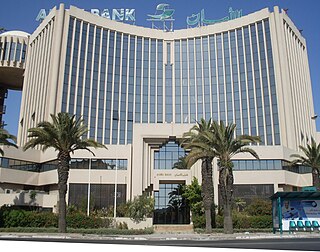
The economy of Tunisia is in the process of being liberalized after decades of heavy state direction and participation in the country's economy. Prudent economic and fiscal planning has resulted in moderate but sustained growth for over a decade. Tunisia's economic growth historically has depended on oil, phosphates, agri-food products, car parts manufacturing, and tourism. In the World Economic Forum Global Competitiveness Report for 2015–2016, Tunisia ranks in 92nd place. Based on HDI latest report, Tunisia ranks 96th globally and 5th in Africa.

Zine El Abidine Ben Ali, commonly known as Ben Ali or Ezzine, was a Tunisian politician who served as the 2nd president of Tunisia from 1987 to 2011. In that year, during the Tunisian revolution, he fled to Saudi Arabia.
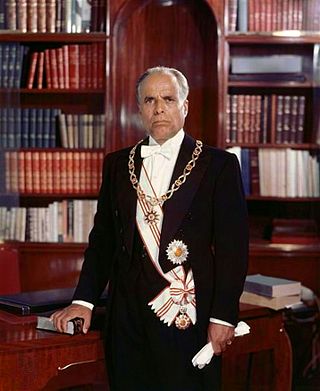
Habib Bourguiba was a Tunisian lawyer, nationalist leader and statesman who led the country from 1956 to 1957 as the prime minister of the Kingdom of Tunisia (1956–1957) then as the first president of Tunisia (1957–1987). Prior to his presidency, he led the nation to independence from France, ending the 75-year-old protectorate and earning the title of "Supreme Combatant".

Mongi Slim was a Tunisian diplomat who became the first African to become the President of the United Nations General Assembly in 1961. He received a degree from the faculty of law of the University of Paris. He was twice imprisoned by the French during the Tunisian struggle for independence.

Espérance Sportive de Tunis, also known as ES Tunis and Espérance ST, is a Tunisian sports club based in Bab Souika neighbourhood of Tunis, Tunisia. The club was founded in 1919, thus being the oldest active football club in Tunisia and its traditional colours are red and yellow. They play in Hammadi Agrebi Stadium. The club is mostly known for its football team, which is currently playing in the Tunisian Professional League 1 and is one of the most popular clubs in Tunisia and is considered one of the continent's giants.

Baghdadi Ali Mahmudi is a Libyan politician who was Secretary of the General People's Committee of Libya from 5 March 2006 to as late as 1 September 2011, when he acknowledged the collapse of the GPCO and the ascendance of the National Transitional Council as a result of the Libyan Civil War. He has a medical degree, specialising in obstetrics and gynecology, and had served as Deputy Prime Minister to Prime Minister Shukri Ghanem since 2003 at the time he was appointed to replace him. He was a part of Gaddafi's inner circle at least prior to his escape in mid-2011. He was arrested in Tunisia for illegal border entry and jailed for six months, although this was later overruled on appeal, however a Tunisian court decided to extradite Mahmoudi to Libya under a request from Libya's Transitional Council.
In its modern history, Tunisia is a sovereign republic, officially called the Republic of Tunisia. Tunisia has over ten million citizens, almost all of Arab-Berber descent. The Mediterranean Sea is to the north and east, Libya to the southeast, and Algeria to the west. Tunis is the capital and the largest city ; it is located near the ancient site of the city of Carthage.

Fouad Mebazaa is a Tunisian politician who was the president of Tunisia from 15 January 2011 to 13 December 2011. He was active in Neo Destour prior to Tunisian independence, served as Minister of Youth and Sports, Minister of Public Health, and Minister of Culture and Information, and was Speaker of the Chamber of Deputies of Tunisia from 1991 to 2011.
Rafiq Belhaj Kacem is a Tunisian politician. He was the Minister of the Interior under former President Zine El Abidine Ben Ali. During the 2010–2011 Tunisian protests, he was fired by former President Ben Ali.

Mustapha Kamel Nabli is a Tunisian economist. He served as Governor of the Central Bank of Tunisia from January 2011 until July 2012.
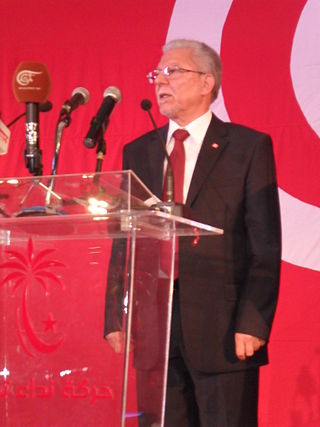
Taïeb Baccouche is a Tunisian politician who has been Secretary-General of the Arab Maghreb Union since 2016. Previously he served in the government of Tunisia as Minister of Education in 2011, in the wake of the Tunisian Revolution, and Minister of Foreign Affairs from 2015 to 2016.

Habib Essid is a Tunisian politician who was Head of Government of Tunisia from 6 February 2015 to 27 August 2016. He was the first Head of Government to be appointed following the adoption of the new constitution and thus considered to be the first Head of Government of the Second Tunisian Republic. He previously served as Minister of the Interior in 2011.
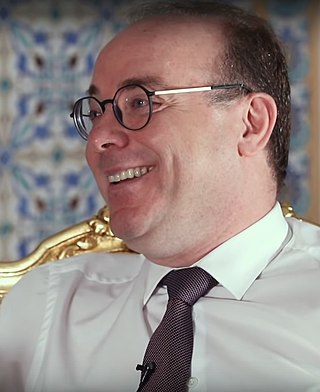
Elyes Fakhfakh is a Tunisian politician. He served as the Minister of Tourism and, starting on 19 of December 2012, as the Minister of Finances as well, under Prime Minister Hamadi Jebali. He served as the Prime Minister of Tunisia from 27 February to 2 September 2020.

Ridha Belhaj, is a Tunisian lawyer, senior official and politician.
Carthage is a commune in Tunis Governorate, Tunisia. It is named for, and includes in its area, the archaeological site of Carthage.
Lamia Zribi is a Tunisian politician. She served as the Minister of Finance until May 1, 2017, when she was succeeded by Fadhel Abd Kefi. She was criticized for failing to prevent the fall of the Tunisian dinar and the continued growth of public sector spending.
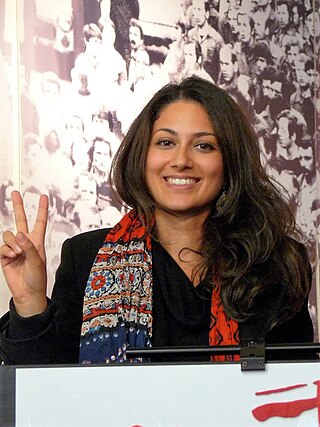
Omezzine Khelifa is a Tunisian politician, activist, and social entrepreneur. Born on 7 July 1982 in Carthage she was raised in La Marsa in the northern suburb of Tunis. After earning her high school diploma in mathematics, she moved to France where she finished her studies as a telecommunications and computer science engineer, specialized in networks and distributed applications. She worked in the finance field as a consultant for Société Générale Investment Banking and fintech compagnies.

Chedly Ayari was a Tunisian politician, economist, and diplomat. He served in several ministerial positions under the government of Habib Bourguiba and was President of the Central Bank of Tunisia from 24 July 2012 to 16 February 2018.

Najla Bouden, also known as Najla Bouden Romdhane, is a Tunisian geologist and university professor who is serving as the Prime Minister of Tunisia. She took office on 11 October 2021, making her the first female prime minister both in Tunisia and the Arab world. She previously served in the education ministry in 2011.
References
- ↑ CIA World Leaders Archived June 29, 2011, at the Wayback Machine
- ↑ A Directory of World Leaders & Cabinet Members of Foreign Governments: 2008-2009 Edition, Arc Manor, p. 407
- ↑ Jacqueline K. Mueckenheim, Countries of the World and Their Leaders Yearbook 2008, Gale Cengage, 2007, p. 1994